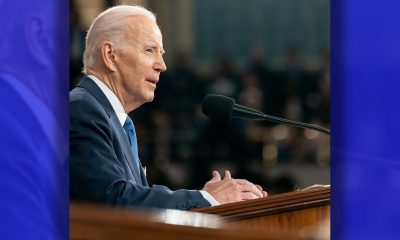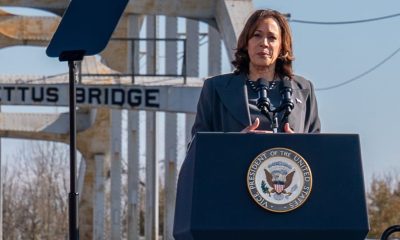#NNPA BlackPress
Leader Schumer, in Letter to Leader McConnell, Puts Forward Structure for a Fair and Honest Bipartisan Impeachment Trial in Senate
NNPA NEWSWIRE — Specifically, Schumer Asks For Testimony From Mick Mulvaney, John Bolton, Michael Duffey And Robert Blair; Schumer Says Dems Are Open To Hearing From Additional Witnesses With Direct Knowledge Of Admin’s Decisions Related To The Delay In Security Assistant Funding To Ukraine And Its Requests For Certain Investigations To Be Announced By The Government Of Ukraine, If The President’s Counsel Or House Managers Wish To Call Such Witnesses.
Schumer Proposed-Trial Structure Would Require Specific Documents and Testimony from Four Key Witnesses
Specifically, Schumer asks for testimony from Mick Mulvaney, John Bolton, Michael Duffey and Robert Blair; Schumer says Dems are open to hearing from additional witnesses with direct knowledge of admin’s decisions related to the delay in security assistant funding to Ukraine and its requests for certain investigations to be announced by the Government of Ukraine, if the president’s counsel or house managers wish to call such witnesses.
Washington, D.C. – In a letter to Senate Majority Leader Mitch McConnell, Senate Democratic Leader Chuck Schumer today put forward a structure for a fair and honest Senate impeachment trial, should articles of impeachment pass the House of Representatives and be delivered to the Senate. Leader Schumer’s letter is the first move to establish a fair bipartisan process in the Senate. In the letter, Leader Schumer asks for specific documents and testimony from key witnesses that were all withheld in the House inquiry. Leader Schumer’s proposed structure would ensure both sides are treated fairly in the trial and given opportunity for rebuttal during opening presentations.
Leader Schumer’s letter also emphasizes that Senate Democrats and Republicans share the belief that the president deserves to have a fair and open trial process that allows both sides to present all of the evidence and adjudicate the case fairly. The letter also highlights the precedent set in the 1999 impeachment trial, and supported by all Republican senators at the time, that House impeachment managers be allowed to call witnesses.
Leader Schumer’s proposal comes after the White House refused to present any exculpatory documents or witnesses to disprove the evidence revealed in House of Representatives impeachment inquiry, and as some Republican Senators have said they are open to hearing from witnesses and analyzing any new evidence before rendering judgement in trial. The letter also comes after Senator McConnell announced that he was already attempting to corral Republican-only support for a Senate resolution defined by the president and his defense team, rather than one crafted and supported by a bipartisan majority of the Senate.
Specifically, Leader Schumer’s proposal would, among other things, establish that the Senate:
- Begin with pre-trial housekeeping measures adopted on Monday, January 6, 2020; swearing-in of the Chief Justice and Senators occur on Tuesday, January 7, 2020; House Managers presentations begin on Thursday, January 9, 2020;
- Provide 24 hours to each side for opening presentations and rebuttals and 16 hours for questioning by senators evenly divided between Republicans and Democrats;
- Issue subpoenas for Robert Blair, Senior Advisor to the Acting White House Chief of Staff; Mick Mulvaney, Acting White House Chief of Staff; John Bolton, former National Security Advisor; and Michael Duffey, Associate Director for National Security, Office of Management and Budget to testify. All four of these witnesses were asked to testify in the House impeachment inquiry but did not appear;
- Schumer’s letter says that Democrats are open to hearing the testimony of additional witnesses having direct knowledge of the Administration’s decisions related to the delay in security assistant funding to Ukraine and its requests for certain investigations to be announced by the government of Ukraine, if the President’s Counsel or House Managers wish to call such witnesses.
- Issue subpoenas for a specific, limited list of documents that will shed additional light on the Administration’s decision making regarding the delay in security assistance funding to Ukraine and its requests for certain investigations to be announced by the government of Ukraine;
- The documents will include communications between administration officials about the withholding of the Ukraine military assistance and its requests for certain investigations to be announced by the government of Ukraine.
- Allow for witnesses to testify and be examined for up to four hours by each side; and
- Upon the conclusion of final arguments, the Senate will begin up to 24 hours of deliberations.
The full text of Leader Schumer’s letter to Leader McConnell can be found here and below:
December 15, 2019
The Honorable Mitch McConnell
Majority Leader
United States Senate
Washington, DC 20510
Dear Leader McConnell:
In a short time, the House of Representatives is expected to approve Articles of Impeachment against President Donald J. Trump. In response to the House’s action, as you have noted, our rules require the Senate to conduct a trial to consider and vote on the Articles of Impeachment. This is an enormously weighty and solemn responsibility that was assigned to the Senate by the Framers of the Constitution.
Senate Democrats believe strongly, and I trust Senate Republicans agree, that this trial must be one that is fair, that considers all of the relevant facts, and that exercises the Senate’s “sole Power of Impeachment” under the Constitution with integrity and dignity. The trial must be one that not only hears all of the evidence and adjudicates the case fairly; it must also pass the fairness test with the American people. That is the great challenge for the Senate in the coming weeks.
In keeping with the bipartisan spirit of the procedures adopted in the trial of President Clinton in 1999, and in order to advance what I believe are our shared objectives for the process in the trial of President Trump, Senate Democrats propose the following provisions for your consideration and in advance of our upcoming discussion. These provisions are modeled directly on the language of the two resolutions that set forth the 1999 trial rules. The first of those resolutions passed the Senate by a vote of 100-0, and the second resolution, allowing House Managers to call witnesses, passed with the support of all Senate Republicans.
Specifically, I propose that pre-trial housekeeping measures be adopted on Monday, January 6, 2020; that the swearing-in of the Chief Justice and Senators occur on Tuesday, January 7, 2020; that after a period for preparation and submission of trial briefs, the House Managers be recognized on Thursday, January 9, 2020 to make their presentation for a period of not more than 24 hours, followed by the presentation by the President’s counsel, also for a period of not more than 24 hours.
In the trial of President Clinton, the House Managers were permitted to call witnesses, and it is clear that the Senate should hear testimony of witnesses in this trial as well. I propose, pursuant to our rules, that the Chief Justice on behalf of the Senate issue subpoenas for testimony by the following witnesses with direct knowledge of Administration decisions regarding the delay in security assistance funds to the government of Ukraine and the requests for certain investigations to be announced by the government of Ukraine: Robert Blair, Senior Advisor to the Acting White House Chief of Staff; Mick Mulvaney, Acting White House Chief of Staff; John Bolton, former National Security Advisor; and Michael Duffey, Associate Director for National Security, Office of Management and Budget. All four of these witnesses were asked to testify in the House impeachment inquiry but did not appear.
We would of course be open to hearing the testimony of additional witnesses having direct knowledge of the Administration’s decisions regarding the delay in security assistance funds to the government of Ukraine and the requests for certain investigations to be announced by the government of Ukraine, if the President’s counsel or House Managers identify such witnesses. In order to ensure that the trial can be completed within a reasonable period of time, I propose that the total time allotted to testimony by each witness be limited to not more than four hours for the House Managers and not more than four hours for the President’s counsel.
I also propose that the Senate issue subpoenas for a limited set of documents that we believe will shed additional light on the Administration’s decision-making regarding the delay in security assistance funding to Ukraine and its requests for certain investigations to be announced by the government of Ukraine. This will be a narrowly drawn request limited to electronic communications, memoranda and related records of the relevant senior officials in the White House, Office of Management and Budget, and Department of State. Our understanding is that these records have already been collected by the White House counsel and counsel in the relevant agencies, so production in response to the Senate subpoenas should be neither burdensome nor time-consuming.
In addition, I propose that as in 1999 there be a period of not more than 16 hours equally divided for Senators’ questions to the House Managers and President’s counsel, and a period of not more than 6 hours equally divided between the House Managers and President’s counsel for final arguments. Finally, I propose that there be a period of not more than 24 hours for deliberations by Senators followed by votes on the Articles of Impeachment.
We believe all of this should be considered in one resolution. The issue of witnesses and documents, which are the most important issues facing us, should be decided before we move forward with any part of the trial.
We believe this proposal, which is set forth in greater detail in the accompanying document, will allow for a trial in which all of the facts can be considered fully and fairly, and in which final votes can be taken within a reasonable period of time, without any unnecessary delay. Conducting the trial according to this plan will also allow the public to have confidence in the process and will demonstrate that the Senate can put aside partisan concerns and fulfill its constitutional duty.
I look forward to discussing this plan with you and to working with you to ensure that the Senate can rise to this critically important occasion.
Sincerely,
Charles E. Schumer
#NNPA BlackPress
Beloved Actor and Activist Louis Cameron Gossett Jr. Dies at 87
NNPA NEWSWIRE — Louis Gossett Jr., the groundbreaking actor whose career spanned over five decades and who became the first Black actor to win an Academy Award as Best Supporting Actor for his memorable role in “An Officer and a Gentleman,” has died. Gossett, who was born on May 27, 1936, in Brooklyn, N.Y., was 87. Recognized early on for his resilience and nearly unmatched determination, Gossett arrived in Los Angeles in 1967 after a stint on Broadway.
The post Beloved Actor and Activist Louis Cameron Gossett Jr. Dies at 87 first appeared on BlackPressUSA.

By Stacy M. Brown
NNPA Newswire Senior National Correspondent
@StacyBrownMedia
Louis Gossett Jr., the groundbreaking actor whose career spanned over five decades and who became the first Black actor to win an Academy Award as Best Supporting Actor for his memorable role in “An Officer and a Gentleman,” has died. Gossett, who was born on May 27, 1936, in Brooklyn, N.Y., was 87. Recognized early on for his resilience and nearly unmatched determination, Gossett arrived in Los Angeles in 1967 after a stint on Broadway.
He sometimes spoke of being pulled over by law enforcement en route to Beverly Hills, once being handcuffed to a tree, which he remembered as a jarring introduction to the racial tensions of Hollywood. In his memoir “An Actor and a Gentleman,” Gossett recounted the ordeal, noting the challenges faced by Black artists in the industry. Despite the hurdles, Gossett’s talent shone brightly, earning him acclaim in groundbreaking productions such as “A Raisin in the Sun” alongside Sidney Poitier. His Emmy-winning portrayal of Fiddler in “Roots” solidified his status as a trailblazer, navigating a landscape fraught with racial prejudice.
According to the HistoryMakers, which interviewed him in 2005, Gossett’s journey into the limelight began during his formative years at PS 135 and Mark Twain Junior High School, where he demonstrated early leadership as the student body president. His passion for the arts blossomed when he starred in a “You Can’t Take It With You” production at Abraham Lincoln High School, catching the attention of talent scouts who propelled him onto Broadway’s stage in “Take A Giant Step.” His stellar performance earned him the prestigious Donaldson Award for Best Newcomer to Theatre in 1952. Though initially drawn to sports, Gossett’s towering 6’4” frame and athletic prowess led him to receive a basketball scholarship at New York University. Despite being drafted by the New York Knicks in 1958, Gossett pursued his love for acting, honing his craft at The Actors Studio under the tutelage of luminaries like John Sticks and Peggy Fury.
In 1961, Gossett’s talent caught the eye of Broadway directors, leading to roles in acclaimed productions such as “Raisin in the Sun” and “The Blacks,” alongside legends like James Earl Jones, Cicely Tyson, Roscoe Lee Brown, and Maya Angelou. Transitioning seamlessly to television, Gossett graced small screens with appearances in notable shows like “The Bush Baby” and “Companions in Nightmare.” Gossett’s silver screen breakthrough came with his role in “The Landlord,” paving the way for a prolific filmography that spanned over 50 movies and hundreds of television shows. From “Skin Game” to “Lackawanna Blues,” Gossett captivated audiences with his commanding presence and versatile performances.
However, his portrayal of “Fiddler” in Alex Haley’s groundbreaking miniseries “Roots” earned Gossett critical acclaim, including an Emmy Award. The HistoryMakers noted that his golden touch extended to the big screen, where his role as Sergeant Emil Foley in “An Officer and a Gentleman” earned him an Academy Award for Best Supporting Actor, making him a trailblazer in Hollywood history.
Beyond the glitz and glamour of Hollywood, Gossett was deeply committed to community activism. In 1964, he co-founded a theater group for troubled youth alongside James Earl Jones and Paul Sorvino, setting the stage for his lifelong dedication to mentoring and inspiring the next generation. Gossett’s tireless advocacy for racial equality culminated in the establishment of Eracism, a nonprofit organization dedicated to combating racism both domestically and abroad. Throughout his illustrious career, Gossett remained a beacon of strength and resilience, using his platform to uplift marginalized voices and champion social change. Gossett is survived by his children, Satie and Sharron.
The post Beloved Actor and Activist Louis Cameron Gossett Jr. Dies at 87 first appeared on BlackPressUSA.
#NNPA BlackPress
COMMENTARY: D.C. Crime Bill Fails to Address Root Causes of Violence and Incarceration
WASHINGTON INFORMER — The D.C. crime bill and so many others like it are reminiscent of the ‘94 crime bill, which produced new and harsher criminal sentences, helped deploy thousands of police and surveilling methods in Black and brown communities, and incentivized more states to build prisons through a massive infusion of federal funding. While it is not at the root of mass incarceration, it significantly accelerated it, forcing a generation of Black and brown families into a never-ending cycle of state-sanctioned violence and incarceration.
The post COMMENTARY: D.C. Crime Bill Fails to Address Root Causes of Violence and Incarceration first appeared on BlackPressUSA.

By Kaili Moss and Jillian Burford | Washington Informer
Mayor Bowser has signed the “Secure DC” omnibus bill passed by the D.C. Council last month. But we already know that this bill will be disastrous for all of D.C., especially for Black and brown residents.
While proponents claim that this legislation “will make D.C. residents safer and more secure,” it actually does nothing to address the root of the harm in the first place and instead maintains a cycle of violence, poverty, and broken community ties. The omnibus bill calls for increased surveillance, drug-free zones, and will expand pre-trial detention that will incarcerate people at a significantly higher rate and for an indeterminate amount of time before they are even tried. This bill will roll back decades of nationwide policy reform efforts and initiatives to keep our communities safe and whole, which is completely contradictory to what the “Secure” D.C. bill claims it will do.
What is unfolding in Washington, D.C., is part of a dangerous national trend. We have seen a resurrection of bad crime bills in several jurisdictions across the country — a phenomenon policy experts have named “zombie laws,” which are ineffective, costly, dangerous for communities of color and, most importantly, will not create public safety. Throwing more money into policing while failing to fund preventative measures does not keep us safe.
The D.C. crime bill and so many others like it are reminiscent of the ‘94 crime bill, which produced new and harsher criminal sentences, helped deploy thousands of police and surveilling methods in Black and brown communities, and incentivized more states to build prisons through a massive infusion of federal funding. While it is not at the root of mass incarceration, it significantly accelerated it, forcing a generation of Black and brown families into a never-ending cycle of state-sanctioned violence and incarceration. Thirty years later, despite spending billions each year to enforce these policies with many of these provisions remaining in effect, it has done very little to create long-term preventative solutions. Instead, it placed a permanent moving target on the backs of Black people, and the D.C. crime bill will do the same.
The bill calls for more pretrial detention. When our loved ones are held on pretrial detention, they are held on the presumption of guilt for an indeterminate amount of time before ever seeing a judge, which can destabilize people and their families. According to experts at the Malcolm Weimer Center for Social Policy at Harvard University, just one day in jail can have “devastating consequences.” On any given day, approximately 750,000 people are held in jails across the nation — a number that beats our nation’s capital population by about 100,000. Once detained, people run the risk of losing wages, jobs, housing, mental and health treatments, and time with their families. Studies show that pretrial detention of even a couple of days makes it more likely for that person to be rearrested.
The bill also endangers people by continuing a misguided and dangerous War on Drugs, which will not get drugs off the street, nor will it deter drug use and subsequent substance use disorders (SUDs). Drug policies are a matter of public health and should be treated as such. Many states such as Alabama, Iowa and Wisconsin are treating the current fentanyl crisis as “Crack 2.0,” reintroducing a litany of failed policies that have sent millions to jails and prisons instead of prioritizing harm reduction. Instead, we propose a simple solution: listen to members of the affected communities. Through the Decrim Poverty D.C. Coalition, community members, policy experts and other stakeholders formed a campaign to decriminalize drugs and propose comprehensive legislation to do so.
While there are many concerning provisions within the omnibus bill, car chases pose a direct physical threat to our community members. In July 2023, NBC4 reported that the D.C. Council approved emergency legislation that gave MPD officers the ability to engage in vehicular pursuits with so-called “limited circumstances.” Sgt. Val Barnes, the head of MPD’s carjacking task force, even expressed concern months before the decision, saying, “The department has a pretty strict no-chase policy, and obviously for an urban setting and a major metropolitan city, that’s understandable.” If our law enforcement officers themselves are operating with more concern than our elected officials, what does it say about the omnibus bill’s purported intention to keep us safe?
And what does it mean when the risk of bodily harm is posed by the pursuit itself? On Saturday, Feb. 10, an Eckington resident had a near-miss as a stolen car barreled towards her and her dog on the sidewalk with an MPD officer in pursuit. What responsibility does the city hold if this bystander was hit? What does restitution look like? Why are our elected officials pushing for MPD officers to contradict their own policies?
Just a few summers ago during the uprisings of 2020, we saw a shift in public perspectives on policing and led to legislation aimed at limiting police power after the highly-publicized murders of loved ones Breonna Taylor and George Floyd — both victims of War on Drugs policing and the powers gained from the ’94 crime bill. And yet here we are. These measures do not keep us safe and further endanger the health of our communities. Studies show that communities that focus on harm reduction and improving material conditions have a greater impact on public safety and community health. What’s missing in mainstream conversations about violent crime is the violence that stems from state institutions and structures that perpetuate racial and class inequality. The people of D.C. deserve to feel safe, and that includes feeling safe from the harms enacted by the police.
Kaili Moss is a staff attorney at Advancement Project, a national racial justice and legal organization, and Jillian Burford is a policy organizer at Harriet’s Wildest Dreams.
The post COMMENTARY: D.C. Crime Bill Fails to Address Root Causes of Violence and Incarceration first appeared on BlackPressUSA.
#NNPA BlackPress
Mayor, City Council President React to May 31 Closing of Birmingham-Southern College
THE BIRMINGHAM TIMES — “This is a tragic day for the college, our students, our employees, and our alumni, and an outcome so many have worked tirelessly to prevent,” Rev. Keith Thompson, chairman of the BSC Board of Trustees said in an announcement to alumni. “We understand the devastating impact this has on each of you, and we will now direct our efforts toward ensuring the smoothest possible transition for everyone involved.”
The post Mayor, City Council President React to May 31 Closing of Birmingham-Southern College first appeared on BlackPressUSA.

By Barnett Wright | The Birmingham Times
Birmingham-Southern College will close on May 31, after more than a century as one of the city’s most respected institutions.
“This is a tragic day for the college, our students, our employees, and our alumni, and an outcome so many have worked tirelessly to prevent,” Rev. Keith Thompson, chairman of the BSC Board of Trustees said in an announcement to alumni. “We understand the devastating impact this has on each of you, and we will now direct our efforts toward ensuring the smoothest possible transition for everyone involved.”
There are approximately 700 students enrolled at BSC this semester.
“Word of the decision to close Birmingham Southern College is disappointing and heartbreaking to all of us who recognize it as a stalwart of our community,” Birmingham Mayor Randall Woodfin said in a statement. “I’ve stood alongside members of our City Council to protect this institution and its proud legacy of shaping leaders. It’s frustrating that those values were not shared by lawmakers in Montgomery.”
Birmingham City Council President Darrell O’Quinn said news of the closing was “devastating” on multiple levels.
“This is devastating for the students, faculty members, families and everyone affiliated with this historic institution of higher learning,” he said. “It’s also profoundly distressing for the surrounding community, who will now be living in close proximity to an empty college campus. As we’ve seen with other institutions that have shuttered their doors, we will be entering a difficult chapter following this unfortunate development … We’re approaching this with resilience and a sense of hope that something positive can eventually come from this troubling chapter.”
The school first started as the merger of Southern University and Birmingham College in 1918.
The announcement comes over a year after BSC officials admitted the institution was $38 million in debt. Looking to the Alabama Legislature for help, BSC did not receive any assistance.
This past legislative session, Sen. Jabo Waggoner sponsored a bill to extend a loan to BSC. However, the bill subsequently died on the floor.
Notable BSC alumni include former New York Times editor-in-chief Howell Raines, former U.S. Sen. Howell Heflin and former Alabama Supreme Court Chief Justice Perry O. Hooper Sr.
This story will be updated.
The post Mayor, City Council President React to May 31 Closing of Birmingham-Southern College first appeared on BlackPressUSA.
-

 Activism4 weeks ago
Activism4 weeks agoOakland Post: Week of March 20 – 26, 2024
-

 #NNPA BlackPress3 weeks ago
#NNPA BlackPress3 weeks agoCOMMENTARY: D.C. Crime Bill Fails to Address Root Causes of Violence and Incarceration
-

 #NNPA BlackPress3 weeks ago
#NNPA BlackPress3 weeks agoMayor, City Council President React to May 31 Closing of Birmingham-Southern College
-

 #NNPA BlackPress3 weeks ago
#NNPA BlackPress3 weeks agoCOMMENTARY: Lady Day and The Lights!
-

 #NNPA BlackPress3 weeks ago
#NNPA BlackPress3 weeks agoFrom Raids to Revelations: The Dark Turn in Sean ‘Diddy’ Combs’ Saga
-

 #NNPA BlackPress3 weeks ago
#NNPA BlackPress3 weeks agoBaltimore Key Bridge Catastrophe: A City’s Heartbreak and a Nation’s Alarm
-

 #NNPA BlackPress3 weeks ago
#NNPA BlackPress3 weeks agoBaltimore’s Key Bridge Struck by Ship, Collapses into Water
-

 Activism3 weeks ago
Activism3 weeks agoOakland Post: Week of March 27 – April 2, 2024




















































1 Comment